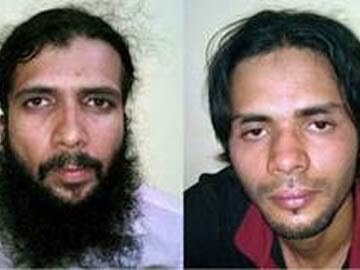
From the Shadows to Handcuffs: The Arrest of Yasin Bhatkal - A Victory for Indian Intelligence!
Yasin Bhatkal, the infamous and elusive ghost who bombed India, had wreaked havoc on the nation with his treacherous and malicious deeds. With his evil machinations, he had sown seeds…

Yasin Bhatkal, the infamous and elusive ghost who bombed India, had wreaked havoc on the nation with his treacherous and malicious deeds. With his evil machinations, he had sown seeds of terror and chaos, causing untold misery and destruction. However, his nefarious reign of terror was finally brought to an end after a long and arduous six-month operation by the brave and valiant Indian security agencies. The news of his apprehension reverberated across the length and breadth of the nation, sending shockwaves through every corner.
Yasin Bhatkal was a notorious terrorist and the founder of the Indian Mujahideen, a militant group that has been responsible for numerous terrorist attacks in India. He was considered a mastermind in the field of terror and had managed to evade law enforcement agencies for many years. Despite the best efforts of Indian security agencies, he remained at large and continued to orchestrate deadly attacks against innocent civilians.
He was responsible for some of the most heinous acts of violence in recent Indian history, including bombings in Delhi, Mumbai, and Bangalore. His ability to evade the authorities for so long was a testament to his cunning and skill as a terrorist mastermind. Despite the best efforts of Indian intelligence agencies, he remained a constant thorn in the side of the Indian security apparatus.
An IB official received crucial information regarding the whereabouts of Yasin Bhatkal, a high-profile suspect, from his source. The informant provided them with a phone number, which they used to monitor Bhatkal's communication and gather intelligence.
The Intelligence Bureau (IB) worked tirelessly to collect information about Bhatkal and shared it with relevant authorities, including the Nepal police. With the help of the Nepal police, they were able to locate Bhatkal at a house in Pokhara. The house was placed under surveillance for a few days to confirm Bhatkal's presence.
To ensure they had the correct suspect, they continued monitoring Bhatkal's movements and communication, which led to the discovery of his right-hand man, Asadullah Akhtar, also known as Haddi, who was present at the same location. Akhtar was a crucial part of Bhatkal's network and was involved in several terrorist activities.
After confirming the presence of both suspects, Indian and Nepalese authorities launched a joint operation to apprehend them. The operation was successful, and both suspects were arrested from the house in Pokhara. The authorities recovered a significant amount of incriminating evidence from the site.
The arrest of Bhatkal and Akhtar was a significant achievement for the agencies involved and served as a warning to terrorist networks worldwide. The security official who referred to Akhtar as a "bonus catch" was correct; his arrest provided valuable intelligence that helped dismantle Bhatkal's network and prevent future terrorist attacks.
But, his capture was a defining moment in the annals of India's fight against terrorism, a moment that brought solace and relief to the nation. The dark clouds of fear and uncertainty that had loomed over the country were finally dispelled, and the people could breathe a sigh of relief.
The capture of Yasin Bhatkal was a testament to the indomitable spirit and relentless efforts of the Indian security forces. It was a shining example of their unflinching determination and unwavering commitment to safeguard the nation from the nefarious designs of terrorists like Bhatkal.
Thus, the nation hailed the capture of Yasin Bhatkal as a resounding victory, a triumph of good over evil, and a message to the world that India would never bow down to the forces of terror.
The arrest of Yasin Bhatkal by the SOG team leader of the Intelligence Bureau was a significant accomplishment in the fight against terrorism in India. The team leader was rewarded for his role in the operation with a letter of commendation and a cash reward of Rs 1 lakh. While this was a recognition of his contribution, it was not considered sufficient to qualify him for a gallantry award.
The then Home Minister, Sushil Kumar Shinde, took note of the team leader's role in the operation and issued a notification offering him a reward of Rs 3.5 lakh. However, the Ministry later withdrew the reward, stating that it was the team leader's duty to carry out such operations.
Apparently, catching terrorists is just part of the job description for Intelligence Bureau officers, and they shouldn't expect any extra compensation for it. After all, why should we reward people for doing what they're paid to do?


